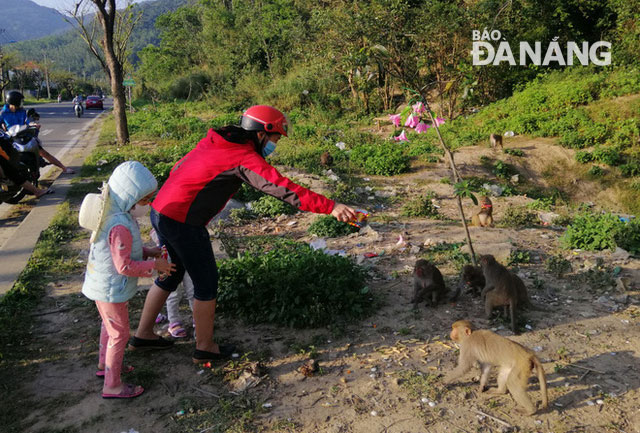Da Nang seeks solutions to discourage people from feeding monkey on Son Tra Peninsula
That Da Nang people and tourists feeding monkeys on the Son Tra Peninsula has resulted in some consequences, including the primates getting used to being fed rather than finding food on their own in the jungle. To tackle such deeply-concerning issue, the Management Board of the Son Tra Peninsula and Da Nang tourist beaches are seeking drastic solutions and strengthening coordination with relevant local agencies to resolve it.
 |
| The act of feeding monkeys has prompted them to rely on humans for food instead of finding it on their own in the jungle. |
During the recent peak tourist season, a herd of wild monkeys have been frequently spotted to gather at the landfill behind Linh Ung Pagoda on the Son Tra Peninsula, scavenging for food.
The monkeys are not afraid of humans. They are often seen scavenging in dumping sites for leftover food, or running after visitors and snatching their bags.
It is concerning that both locals and tourists visiting the peninsula have used candies and fruits, and other types of food to lure these monkeys into a position where they can be photographed.
For a long time, tourists have used candies and fruits, and other types of food to lure these monkeys into a position where they can be photographed.
In his perspectives, Deputy Head of the Management Board of the Son Tra Peninsula and Da Nang tourist beaches Phan Minh Hai said feeding monkeys creates many negative effects to both animals and humans.
The habit has led to the primates’ decreased ability of seeking food in nature and increased their dependence on people to fill their stomach, which is not really good for their digestive system. Tourists have accidentally changed the survival instinct of the younger generations of monkeys on the Son Tra Peninsula, when mother monkeys taught their children to beg for food from visitors instead of finding things to eat in the woods.
“Visitors are making a mistake, not knowing that the monkeys being friendly means they are losing their natural food foraging habit” a local expert said.
Besides, that tourists lure or tease the animal with food also makes them become aggressive, hereby increasingly attacking people.
Such a habit also places the animals at a high risk of road accidents. According to the Da Nang-based GreenViet, a non-profit organisation working to conserve important ecosystems and endangered species in Central Viet Nam and Central Highlands, about 10 monkeys died or were injured in accidents due to the fact that they spilled into the street to “ask” people for food.
In addition to the negative impact on the monkeys, direct contact with wild animals puts humans at the risk of catching such diseases as flu and gingivitis.
In terms of the environmental impacts, litter left by mindless people who feed monkeys pollutes the environment and affects the natural ecosystem.
Tourists are recommended to keep themselves safe and preserve the natural habitat for local wildlife by keeping their distance from wild animals.
As one of the volunteers actively responding to the restriction of feeding monkeys, Ms Thanh Ngoc Truc residing in Cam Le District underlined a must-do to take more effective solutions in a bid to raise public awareness of the negative consequences of wildlife feeding.
Till date, the Management Board of the Son Tra Peninsula and Da Nang tourist beaches have set up warning signs asking visitors not to feed wild animals, but many just ignore.
The Management Board is recruiting volunteers aged 19 – 35 who are in charge of being on duty during 9 -11am and 3 - 5pm periods at certain positions where people usually feed monkeys such as areas in front of the Linh Ung Pagoda’s entrance gate, Mieu Doi area, and a restaurant which is 300m away from the pagoda. The presence of the volunteers is expected to limit the practice of feeding the wildlife in the time to come.
By MINH LE – Translated by A.T